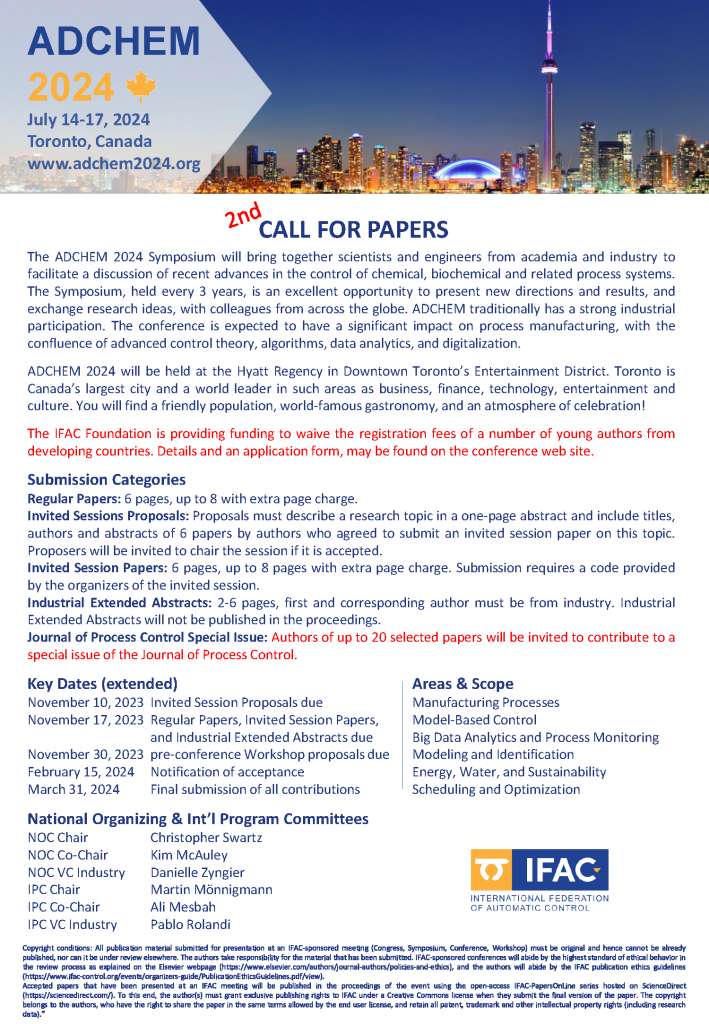Prof. Thomas A. Adams II <https://SystemsControlCanada.hosted.phplist.com/lists/lt.php?tid=lKEM5m2eOpqqMzkopO6fHwIYhUOtCWdfkMLAgVIn2VPC3A22wd1bo4GjwP4QRuOH> at the Norwegian University of Science and Technology (NTNU) is seeking two PhD Candidates on Greener and More Secure Chemical Processes. The position is a part of the NTNU-MIT Energy Research Programme, and candidates will collaborate directly with faculty members at the Chemical Engineering Department at MIT. From the project description <https://SystemsControlCanada.hosted.phplist.com/lists/lt.php?tid=A+9XFgbXBrW4ofPXlHsivQIYhUOtCWdfkMLAgVIn2VPC3A22wd37o4GjwP4QRuOH>:
The Process and Power Program, Department of Energy and Process Engineering (EPT) at the Norwegian University of Science and Technology (NTNU) is seeking PhD Candidates in the NTNU-MIT Energy Research Programme under the research topic “Greener, More Secure Energy Supply Chains through Improved Processes”. As a part of the research programme, NTNU PhD candidates will collaborate with MIT professors and researchers on important research topics in energy. This topic focuses big-picture technology decisions on how to address tradeoffs between economics, security, and environmental issues in energy supplies from a triple bottom line of sustainability standpoint. One key methodology includes eco-technoeconomic analyses of proposed early stage technologies in order to value and identify potential technology solutions (new processes, technologies, unit operations, etc.) that are the most promising from a commercial and practical standpoint (and which to reject). These will be done with the big picture in mind while focusing on the technical details at the process and unit operation level, understanding that the supply chain and regional impacts are important and impact all the way down to the process design level.
Two projects are possible:
Project 1: PhD Candidate in Green Hydrogen Economy Technologies and Supply Chains
Project 2: PhD Candidate in Electrification of Chemical Processes
Prof. Adams is looking for talented candidates with backgrounds in chemical process systems engineering, energy systems engineering, and other related fields. Expertise is sought in process simulation software such as Aspen Plus, Hysys, ProMax, life cycle assessment software such as SimaPro or OpenLCA, and optimization software such as GAMS, PYOMO are desirable, as well as knowledge of their underlying methodologies.
You can read the full description and apply through the official job posting on JobbNorge <https://SystemsControlCanada.hosted.phplist.com/lists/lt.php?tid=0yJxbQ6mRd2EyxwiqH309wIYhUOtCbdfkMLAgVIn2VPC3A22wd2Lo4GjwP4QRuOH>. Questions can be sent to Prof. Adams <mailto:[email protected]> directly.
______________________ _____________________________
Thomas A. Adams II A412 Varmetekniske lab (VATL)
Professor Kolbjørn Hejes v 1B
BS, BS, PhD, PEng Gløshaugen, Trondheim, Norway
_____________________ ______________________________
Institutt for energi- Norges teknisknatur- (NTNU)
og prosessteknikk (EPT) vitenskapelige universitet
———————- —————————-
Department of Energy Norwegian University of & Process Engineering Science and Technology (NTNU)
====================== =============================
Submit your preprints, post-prints, and models to the Living Archive for Process Systems Engineering (LAPSE) at https://SystemsControlCanada.hosted.phplist.com/lists/lt.php?tid=eZssM4kDGGOFTy+YdYolWgIYhUOtCbdfkMLAgVIn2VPC3A22wd2ro4GjwP4QRuOH
<https://SystemsControlCanada.hosted.phplist.com/lists/lt.php?tid=xyfSmPUbmRipu89Y6AveTgIYhUOtCfdfkMLAgVIn2VPC3A22wd1bo4GjwP4QRuOH>
—
